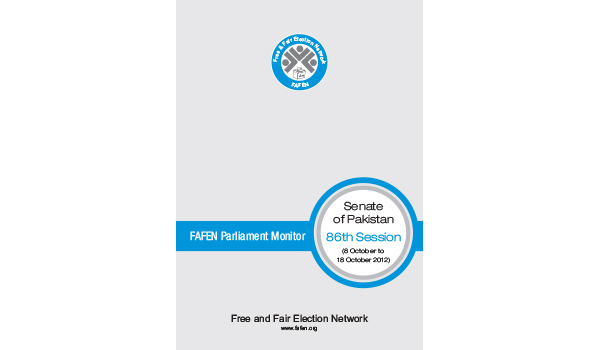 Low attendance of senators, lackluster debates on the issues of national significance such as the deteriorating law and order, devastation caused by floods in Balochistan and increase in the prices of petroleum products marked the 86th session, which took up only 37% of the listed agenda items.
Low attendance of senators, lackluster debates on the issues of national significance such as the deteriorating law and order, devastation caused by floods in Balochistan and increase in the prices of petroleum products marked the 86th session, which took up only 37% of the listed agenda items.
The house did not take up nine resolutions, six motions under rule 218, and 120 questions appearing on the agenda. However, the upper house passed the Drug Regulatory Authority of Pakistan which seeks to set up a regulatory body to bring harmony in inter-provincial trade and commerce of drugs and therapeutic goods. Two other treasury-backed bills were introduced and sent to standing committees.
As observed in the previous sessions, the agenda for the private members’ days was set ambitiously making it impossible to take up all items during a single sitting. Around 55% (of the total 51 items) of the agenda was contributed by private members, of which only two items were taken up and discussed on the floor of the house.
In comparison, only six government’s agenda items were left unaddressed. The session lasted 11 days from 8-18 October meeting for 22 hours and 52 minutes. Each sitting, on average, met for two hours and 32 minutes witnessing an average delay of 43 minutes.
Since the Senate Secretariat does not make public the senators attendance record, FAFEN observers conduct a headcount at the start and end of each sitting and documents the actual time spent on the floor by the Chairman, Deputy Chairman, Leader of the House and the Leader of the Opposition. Low attendance of senators continued during the session, as on average only eight senators were observed at the outset and 20 at the adjournment of each sitting. The quorum visibly lacking at various stages of the session was not pointed out by any of the legislators.
The Leader of the House attended eight sittings for 1,142 minutes (83% of the total time), while the Leader of the Opposition was there during the entire session for 1,294 minutes (94% of the session time). The Chairman chaired the proceedings for 65% of the session time and the remaining time was presided over by the Deputy Chairman.
The parliamentary leaders of the PML and BNPA remained absent during the entire session while the
ANP party head attended eight sittings, JUIF four and the MQM leader was present during two sittings. Among single member parties, PMLF senator attended seven and that of NP member was present in five sittings.
The upper house briefly debated law and order on a motion under rule 218 with a particular reference to target killings and sectarian violence in Balochistan, Karachi and Gilgit-Baltistan. Seven senators (7% of the total membership – 104) – three MQM, two ANP and one each of NP and PPPP – spoke on the motion for 57 minutes (4% of the session time).
Similarly the house took up an adjournment motion on the devastation caused by floods in Balochistan.
A total of 17 senators – 13 male and four female – spoke on the motion for 132 minutes (10% of the session time). The price hike in petroleum products was taken up through a calling attention notice jointly moved by MQM and PMLN. Likewise, the issue of slow investigation of Bhoja Airlines crash, publication of advertisement for the post of CEO of Drug Regulatory Authority, and the imposition of tax by PTA on overseas telephone calls were also brought to the house.
The attack on the national peace award winner, Malala Yousafzai, was condemned by the upper house by adopting a resolution. Similarly, another resolution was adopted by the house to express condolences on the demise of a former senator Muhammad Ali Khan. The resolutions on deweaponization of Karachi and the airing of the blasphemous film ‘Innocence of Muslims’ were discussed but not passed by the house.
Twenty-six senators (six women and 20 men) submitted 175 questions – 171 starred (requiring oral replies) and four unstarred (requiring written replies). Only 51 starred questions (30%) received oral replies by the respective ministries. Additionally 86 supplementary questions were asked. Seventy percent of the starred questions were left unaddressed due to either ministerial or the prime mover’s absence. The main opposition party – PMLN – asked 67 questions. JUIF and MQM asked 26 questions each, PPPP 21, ANP 20, BNPA 14, while a single question was submitted by Independents.
None of the fifty-seven points of order raised during the session attracted the chair’s formal ruling. Unless the chair gives a formal ruling on a point of order, it does not lead to any assembly output.
ANP and PMLN senators jointly walked out of the house to protest against ministerial absence. In another instance ANP and PPPP senators staged a walkout to oppose the sacking of Karachi Electric Supply Company’s employees. MQM members staged two walkouts to oppose the increased tariff of overseas phone calls and a PPPP parliamentarian protested on not being granted permission to speak about judiciary.
For complete report click here








